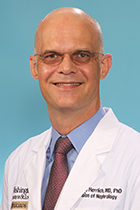Andreas Herrlic h, MD, PhD, Associate Professor of Medicine, Division of Nephrology, has received a five-year $1.125 million grant from NIDDK to fund a research project titled The Role of Adam17 Substrates in Progressive Kidney Disease.
h, MD, PhD, Associate Professor of Medicine, Division of Nephrology, has received a five-year $1.125 million grant from NIDDK to fund a research project titled The Role of Adam17 Substrates in Progressive Kidney Disease.
Preliminary studies show that proximal tubular ADAM17-cleaved substrates promote progressive kidney disease. The goal of Dr. Herrlich’s study is to define the molecular mechanism by which ADAM17 and its substrates contribute to progressive kidney disease and to evaluate the therapeutic potential of inhibiting the pathways involved. Since there are no current therapies that prevent or treat progressive kidney disease associated with fibrosis, it is hoped that the study will lead to development of new treatment options for kidney fibrosis in CKD patients.
Kidney fibrosis in CKD patients is common and confers a remarkably high morbidity and mortality. It can result from different injuries and diseases, but the underlying pro-fibrotic (“scarring”) patho-physiologal response of the kidney is similar.
“Mortality on dialysis is roughly 30% per year, however, specific therapies to prevent, slow down or reverse fibrosis are severely lacking,” says Herrlich. “To date only blood pressure control has been shown to slow progression of CKD. We hope that our studies will expand treatment options by defining the first kidney-specific therapeutic targets that might slow progression of this disease.”
The prevention and/or treatment of kidney fibrosis would significantly reduce morbidity and mortality and reduce the need for dialysis. Drugs that inhibit select ADAM17 substrates or their downstream effects are already in clinical use and could be repurposed for the treatment of progressive kidney disease.